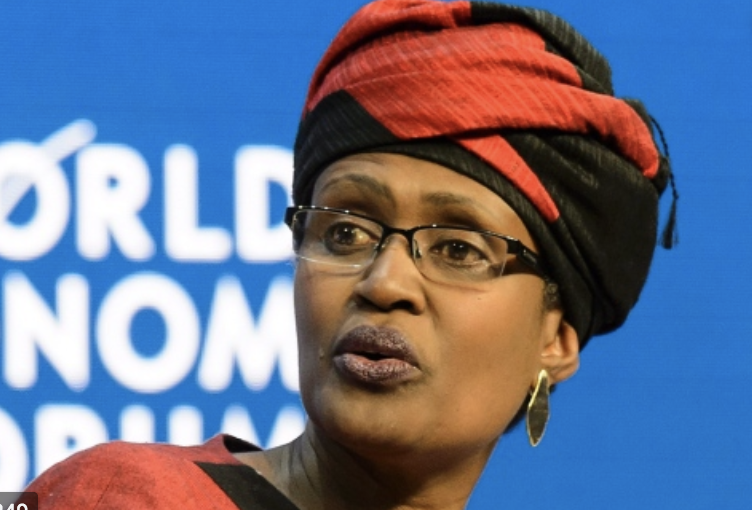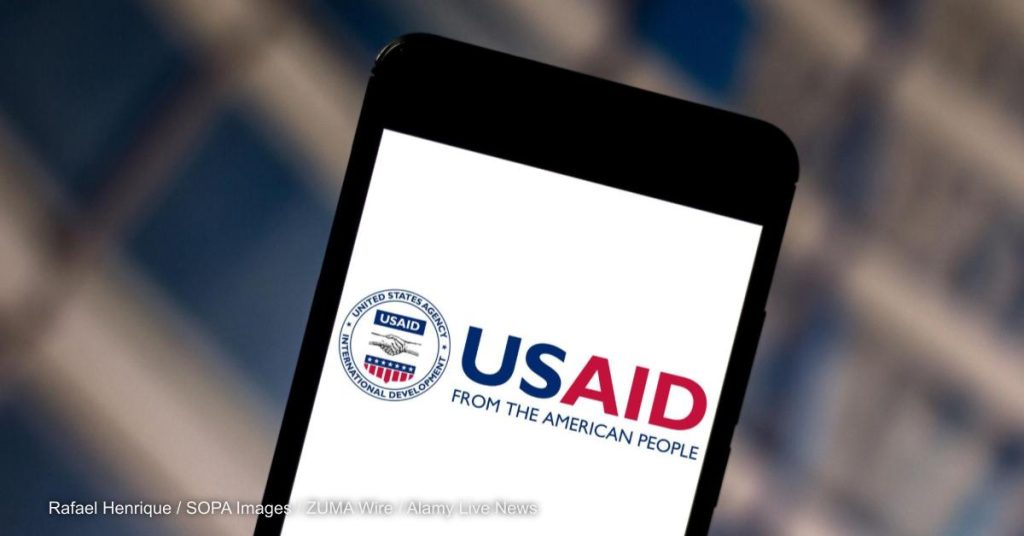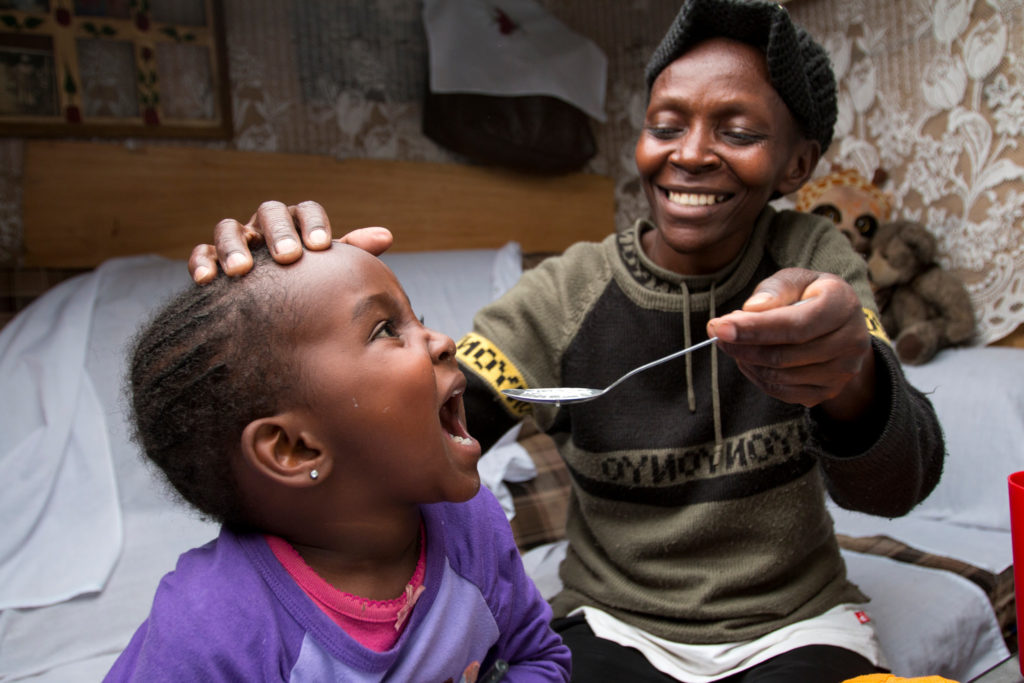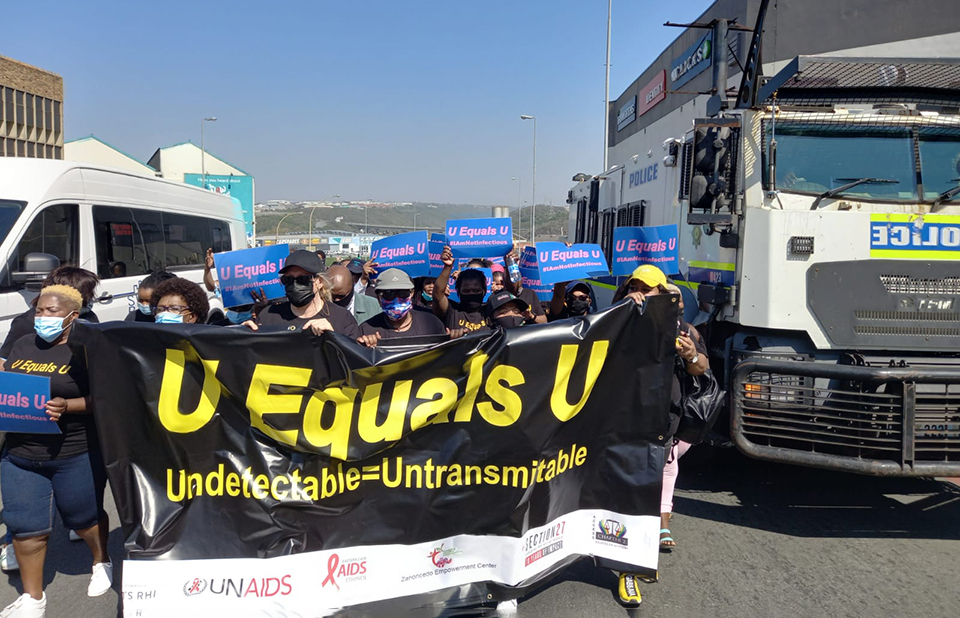U.N. pleads with Trump to save global anti-AIDS program; U.S. agency is silenced
Colin Stewart is a 45-year journalism veteran living in Southern…
The U.S. can help end AIDS by 2030, says U.N. anti-AIDS leader Winnie Byanyima

The United Nations is pleading with U.S. President Donald Trump to keep supporting the country’s global anti-AIDS program despite his shutdown of U.S. foreign aid.
Meanwhile, staff members of USAID, the country’s foreign aid agency, have been ordered to keep quiet about their work and U.S. conservatives have set their sights on reducing or eliminating funding for the President’s Emergency Plan for AIDS Relief (Pepfar),, which totaled $6.5 billion in the last fiscal year.
[Jan. 24 update: “USAID is back to communicating with the public — but with strict limits: no talk of DEIA [diversity, equity, inclusion and accessibility] rollbacks, hiring freezes, or paused foreign aid. Existing DEIA content? Archived. New content? Not happening. Staff and partners are treading carefully,” Devex reports.]On Jan. 20, Trump ordered a 90-day suspension of all U.S. foreign aid programs pending reviews to determine whether they are aligned with Trump’s policy goals.
U.S. foreign aid is the No 1 supporter of Pepfar, which since 2004 has saved 20 million lives or more through its work combatting HIV / AIDS around the world. The program has been under attack from many U.S. conservatives, who succeeded last year in reducing America’s Pepfar funding commitment to just one year instead of the previous series of five-year funding authorizations. A renewed vote on Pepfar funding is needed early in 2025.
The United Nations anti-AIDS program has appealed to Trump to continue U.S. support for Pepfar:
“Under President Trump’s leadership, the United States of America has the opportunity to accelerate the global HIV response and end AIDS by 2030,” said Winnie Byanyima, Executive Director of UNAIDS.
During President Trump’s first administration, he demonstrated strong leadership in the fight against AIDS by launching the groundbreaking initiative Ending the HIV Epidemic in the US and reaffirming the United States of America’s steadfast commitment to the United States President’s Emergency Plan for AIDS Relief (PEPFAR), the Global Fund to Fight AIDS, Tuberculosis, and Malaria (Global Fund), and the Joint United Nations Programme on HIV/AIDS (UNAIDS).
For more than two decades, the United States government has led in the global HIV response, saving more than 26 million lives. The country’s unwavering commitment to addressing HIV stands as a global gold standard of leadership.
Since the start of the AIDS pandemic, innovations led by the United States in HIV prevention and treatment technologies have saved millions of lives around the world.
Today, we are on the brink of ending AIDS thanks to advances in developing long-acting medicines which both prevent and treat HIV. These new medicines give us a real shot at ending AIDS with the United States of America at the forefront. UNAIDS is poised and ready to work side by side with the new Administration to save millions of lives by bringing these new medicines swiftly to scale.
The United States government’s partnership with UNAIDS remains an indispensable force for progress and accountability in the global HIV response. UNAIDS looks forward to further strengthening its collaboration with the United States to achieve our shared goal of ending AIDS.

However, the U.S. foreign aid agency is keeping quiet about the situation, according to Devex, a newsletter covering international development:
Just before Trump’s inauguration, some USAID staff members got a memo: Stop talking. An email obtained by Devex Senior Reporter Sara Jerving revealed “clear guidance” from Washington to pause all public communications about their work starting Jan. 20.
What’s unclear? Whether the directive applies just to USAID employees or also to the independent organizations they work with. USAID hasn’t commented — well, they were told not to! — leaving partners guessing and playing it safe to avoid potential fallout with the new leadership.
For now, USAID partners are holding their breath, and their tweets, as they navigate this new era of tight-lipped caution and domestic focus.
In the following article, published just before Trump took office, the Health Policy Watch network reported on U.S. conservatives’ efforts to cut funds for Pepfar:

Influential conservatives have long sought to curtail the United States President’s Emergency Plan for AIDS Relief (PEPFAR) – and the actions of four nurses in Mozambique may have inadvertently given them the ammunition to do just that.
Deeply uncomfortable with the sexual dimension of HIV transmission, the powerful Heritage Foundation, which authored the conservative Project 2025 blueprint for a Donald Trump takeover, argues that PEPFAR should be “restructured as a development rather than an emergency assistance program”.
Right-wing organisations and politicians have also claimed the plan is being used to “promote abortion, LGBT ideology, and comprehensive sexuality education”, a school sex education programme.
But they had so far failed to demonstrate this until last week – when the US State Department Bureau of Global Health Security and Diplomacy (GHSD), which implements PEPFAR, provided documentation in a briefing to the Senate Foreign Relations Committee and House Foreign Affairs Committee that the Mozambique nurses, whose salaries are partly covered by PEPFAR, also provided abortions.
‘Unacceptable violation’
The US has not allowed its foreign aid to be used to fund abortions or lobby for abortions since it enacted the Helms Amendment in 1974.
However, the four nurses, whose salaries were partly covered by PEPFAR, did not know that they could not provide abortions (which are legal in Mozambique) if they received PEPFAR funding.
GHSD’s “compliance mechanisms identified this violation, and we took immediate corrective action with the partner”, the bureau said in a statement issued on Friday, the day after it had briefed politicians with oversight of PEPFAR about the issue.
“This violation is unacceptable, and the US government has made that clear at all levels of program implementation, as well as immediately suspended funding,” it added.
PEPFAR secured “reimbursement from the Government of Mozambique for the salaries of the four health workers involved in the violations of award terms and conditions” and in future will require “an annual signed attestation by PEPFAR-funded clinical service providers to ensure compliance with US funding restrictions”.
Although the GHSD uncovered, rectified the transgression, and reported it to the politicians, Republicans have jumped on the report as an opportunity to reform PEPFAR.
‘Disgusting’
“It is disgusting that the Biden Administration has allowed US taxpayer dollars to be used to perform abortions overseas,” fumed Republican Senator Jim Risch, chair of the Senate Foreign Relations Committee. “This violation means that the future of the PEPFAR program is certainly in jeopardy.”
Republican Congressional representative Chris Smith, whose committee oversees PEPFAR, promised a “series of hearings to investigate the activities by PEPFAR-funded countries” and to hold the Centers for Disease Control and Prevention (CDC) and GHSD to account.
“This is just the tip of the iceberg,” said Smith, who chairs the House Foreign Affairs Subcommittee on Africa and Global Health Security and Diplomacy Bureau.
“Frankly, it’s not a surprise to find that they are performing abortion with US taxpayer dollars. Their denials over the years have rung hollow in the face of their aggressive promotion of abortion and collaboration with some of the largest international abortion providers.”
With Trump assuming the White House on Monday (20 January), and his party controlling the US Senate and House, the Republican Party is in a strong position to shake up PEPFAR.

Democratic Representative Gregory Meeks warned that “using this unfortunate error as a pretext to end funding for PEPFAR, which has saved millions of lives by combating HIV around the world, would be a grave mistake”.
Furthermore, said Meeks: “CDC’s response to this violation shows that when wrongdoing occurs, there are checks in place to address them and Mozambique reimbursed the US government for the $4,066, which accounts for less than 0.001% of one year of PEPFAR’s funding for Mozambique.”
HIV is a ‘lifestyle disease’
PEPFAR is the most successful US aid programmes ever, credited with saving over 26 million lives since its launch by Republican president George W Bush in 2003.
By last September, PEPFAR was funding antiretroviral medicine for 20.6 million people to suppress HIV in their bodies.
Yet far-right conservatives in the US and Africa are deeply ambivalent about PEPFAR, largely because they believe that HIV is a sexually transmitted “lifestyle disease” – the inference being that most of those with HIV have themselves to blame.
The Heritage Foundation spelt this out in a 2023 paper, arguing that, “except in cases of rape or maternal transmission, HIV/AIDS in the US and in developing countries is primarily a lifestyle disease (like those caused by tobacco) and as such should be suppressed through education, moral suasion, and legal sanctions”.
The foundation added that “for conservatives committed to personal responsibility, [PEPFAR] also should not enjoy greater priority than deadlier and more unavoidable diseases receive in the allocation of public funds”.
According to the Heritage Foundation, “as with any venereal disease, education and abstinence could end the AIDS epidemic” – although this approach has failed miserably in both the US and Africa.

Undetectable viral load = untransmittable HIV
Scientific evidence from multiple studies shows that one of the most powerful ways to end HIV transmission is to ensure that people living with HIV are on antiretroviral (ARV) medicine and have undetectable viral loads, because then they do not transmit the virus – even during unprotected sex.
New HIV infections decreased by 39% world-wide between 2010 and 2023, largely thanks to the massive campaign against the disease focused on the rollout of ARVs, education about its transmission and condom distribution.
But there are enclaves where HIV still thrives, described by UNAIDS as “key populations” which include men who have sex with men, sex workers, people who inject drugs, transgender people and prisoners.
“In 2022, the relative risk of acquiring HIV was 14 times higher for people who inject drugs, 23 times higher for gay men and other men who have sex with men, nine times higher for sex workers and 20 times higher for transgender women than in the wider population globally,” according to UNAIDS.
In 2022, 55% of all new HIV infections in 2022 occurred among people from key populations and their sexual partners.
But these groups are amongst those most denigrated by right-wing groups who ignore the scientific evidence of their vulnerability and instead claim that the Biden Administration, UNAIDS and anyone following this evidence are trying to impose a “woke agenda” on the world.
‘Radical sexual agenda’
Their crusade against the mainstream HIV sector’s approach to ending the disease gained momentum in 2023 as the US geared up to reauthorise PEPFAR for a further five years.
On 1 May 2023, US right-wing groups claimed in a letter sent to Senate and Congress leaders that PEPFAR grantees “are using taxpayer funds to promote a radical sexual and reproductive health agenda”.
The first signature on the letter is that of Heritage Foundation president Kevin Roberts. Other signatories include Austin Ruse of the radical Catholic group, the Center for Family and Human Rights (C-FAM) that opposes contraception, and Tony Perkins of the Family Research Council, a radical evangelical group that has supported African governments to pass anti-homosexuality laws and even lobbies against the HPV vaccine.
The letter cited examples of PEPFAR-supported organisations that are promoting abortion but their claims were not supported by evidence.
A similar letter was sent on 6 June 2023 to the same US politicians by African politicians and religious leaders – primarily Catholic and evangelical bishops, and Ugandan MPs – claiming that PEPFAR “is supporting so-called family planning and reproductive health principles and practices, including abortion, that violate our core beliefs concerning life, family, and religion”.
Representative Smith, who co-sponsored PEPFAR’s refinancing in 2018, also claimed PEPFAR is being used to “promote abortion on demand” in a letter to his congressional colleagues in June of that year.
March deadline for PEPFAR reauthorisation
After much wrangling, PEPFAR was eventually reauthorised in March 2024 – but only for one year instead of the customary five. This mandate expires in March.
With Trump’s “America First” approach and his mandate to Elon Musk and Vivek Ramaswamy to slash the federal budget, PEPFAR funds are almost certain to be cut.
However, big policy changes are also likely, particularly if Project 2025’s proposals are implemented. These include stopping all US aid to LGBTQ groups and even preventing support for contraception and comprehensive sexual education.
Ultimately, if the Heritage Foundation and its allies get their way, PEPFAR will be transformed into “a development program focused on developing sustainable heath systems and the prevention and treatment of infectious diseases, including HIV/AIDS”.
To prepare for this and to encourage more domestic support for HIV, the foundation proposes that PEPFAR cuts its coverage of ARVs by 10% every year in the next five -year phase.
But finding the money to cover half the cost of ARVs within five years will be impossible for many of the countries that receive PEPFAR support. Some of Africa’s most vulnerable people are going to bear the brunt of this policy change, which may roll back decades of progress against HIV and AIDS.




